Leadership Style Analysis: Personal Reflection and Experience Report
VerifiedAdded on 2021/06/16
|9
|2233
|628
Report
AI Summary
This report delves into the student's personal leadership style, focusing on the development of a transformational approach rooted in Christian values of integrity and authenticity. The student identifies key traits such as the ability to inspire, motivate, and foster innovative thinking. The report includes a detailed reflection on a past leadership experience using the Gibbs reflective model, where the student analyzes a project failure, identifying shortcomings in listening skills, emotional intelligence, and empathy. The student concludes with an action plan for improvement, including workshops, evidence-based research, and mentorship, aiming to cultivate effective leadership skills based on intuition, risk-taking, and a commitment to ethical decision-making. The student draws on the experience to highlight the importance of self-regulation, empathy, and effective communication in achieving successful outcomes and building strong team dynamics.
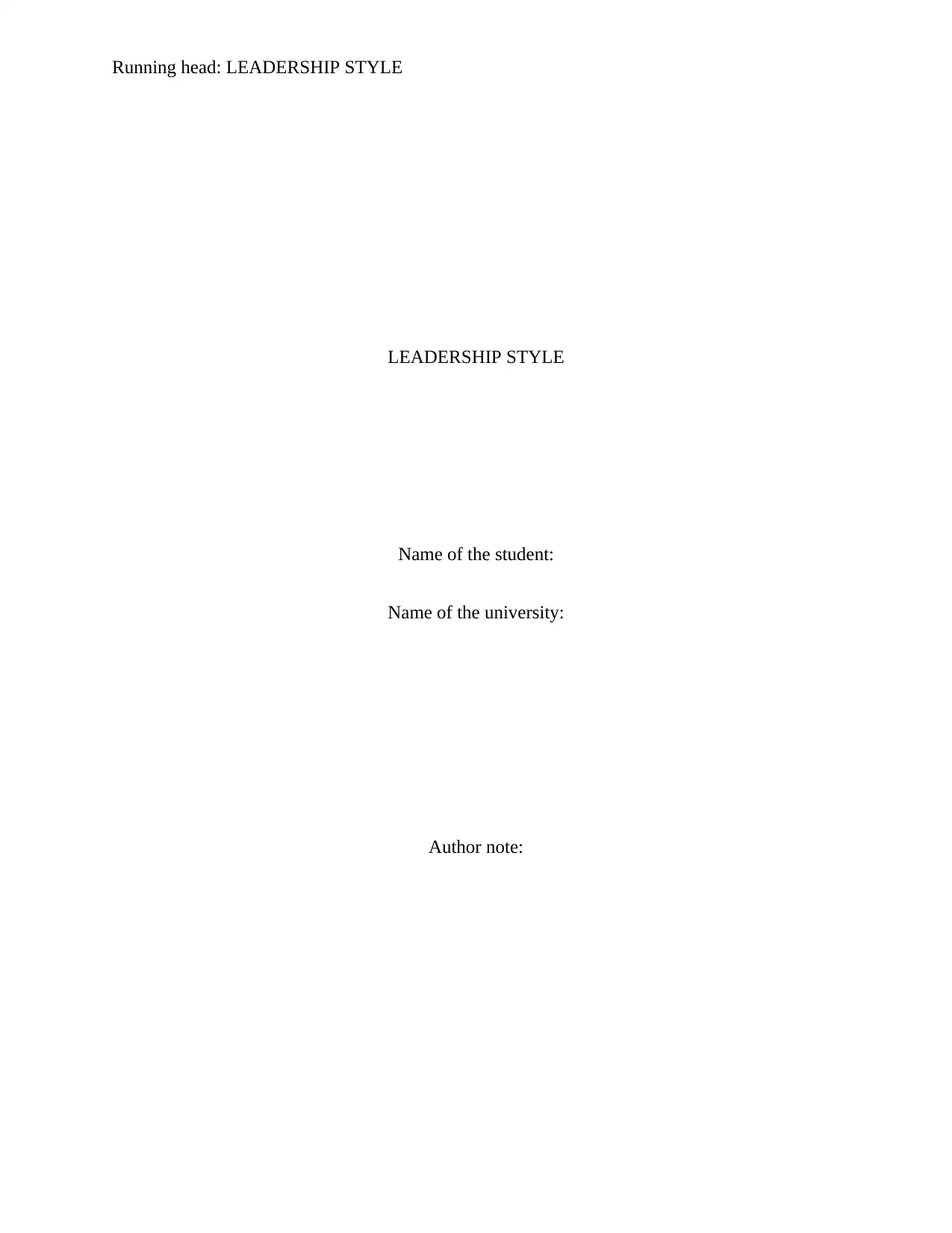
Running head: LEADERSHIP STYLE
LEADERSHIP STYLE
Name of the student:
Name of the university:
Author note:
LEADERSHIP STYLE
Name of the student:
Name of the university:
Author note:
Paraphrase This Document
Need a fresh take? Get an instant paraphrase of this document with our AI Paraphraser
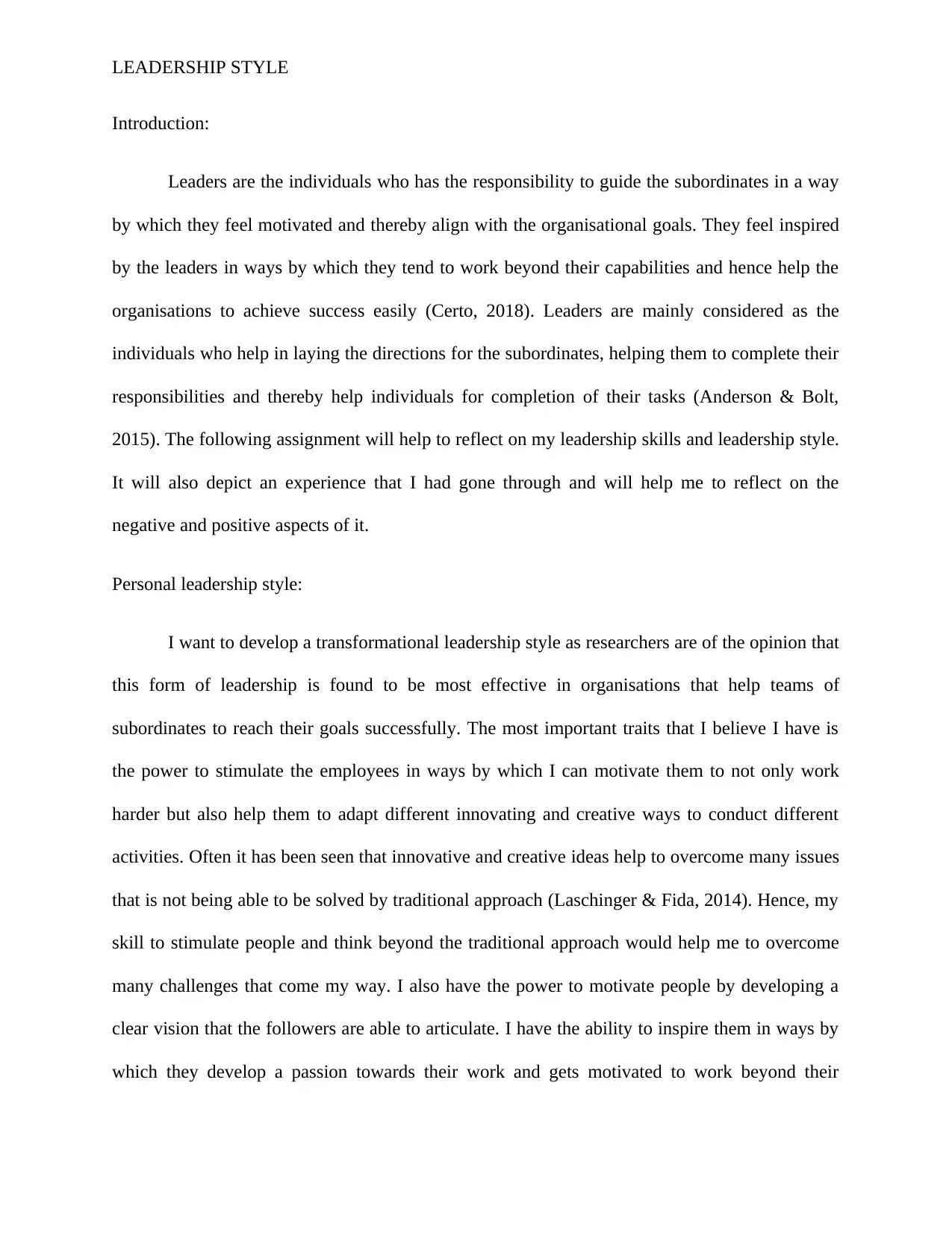
LEADERSHIP STYLE
Introduction:
Leaders are the individuals who has the responsibility to guide the subordinates in a way
by which they feel motivated and thereby align with the organisational goals. They feel inspired
by the leaders in ways by which they tend to work beyond their capabilities and hence help the
organisations to achieve success easily (Certo, 2018). Leaders are mainly considered as the
individuals who help in laying the directions for the subordinates, helping them to complete their
responsibilities and thereby help individuals for completion of their tasks (Anderson & Bolt,
2015). The following assignment will help to reflect on my leadership skills and leadership style.
It will also depict an experience that I had gone through and will help me to reflect on the
negative and positive aspects of it.
Personal leadership style:
I want to develop a transformational leadership style as researchers are of the opinion that
this form of leadership is found to be most effective in organisations that help teams of
subordinates to reach their goals successfully. The most important traits that I believe I have is
the power to stimulate the employees in ways by which I can motivate them to not only work
harder but also help them to adapt different innovating and creative ways to conduct different
activities. Often it has been seen that innovative and creative ideas help to overcome many issues
that is not being able to be solved by traditional approach (Laschinger & Fida, 2014). Hence, my
skill to stimulate people and think beyond the traditional approach would help me to overcome
many challenges that come my way. I also have the power to motivate people by developing a
clear vision that the followers are able to articulate. I have the ability to inspire them in ways by
which they develop a passion towards their work and gets motivated to work beyond their
Introduction:
Leaders are the individuals who has the responsibility to guide the subordinates in a way
by which they feel motivated and thereby align with the organisational goals. They feel inspired
by the leaders in ways by which they tend to work beyond their capabilities and hence help the
organisations to achieve success easily (Certo, 2018). Leaders are mainly considered as the
individuals who help in laying the directions for the subordinates, helping them to complete their
responsibilities and thereby help individuals for completion of their tasks (Anderson & Bolt,
2015). The following assignment will help to reflect on my leadership skills and leadership style.
It will also depict an experience that I had gone through and will help me to reflect on the
negative and positive aspects of it.
Personal leadership style:
I want to develop a transformational leadership style as researchers are of the opinion that
this form of leadership is found to be most effective in organisations that help teams of
subordinates to reach their goals successfully. The most important traits that I believe I have is
the power to stimulate the employees in ways by which I can motivate them to not only work
harder but also help them to adapt different innovating and creative ways to conduct different
activities. Often it has been seen that innovative and creative ideas help to overcome many issues
that is not being able to be solved by traditional approach (Laschinger & Fida, 2014). Hence, my
skill to stimulate people and think beyond the traditional approach would help me to overcome
many challenges that come my way. I also have the power to motivate people by developing a
clear vision that the followers are able to articulate. I have the ability to inspire them in ways by
which they develop a passion towards their work and gets motivated to work beyond their
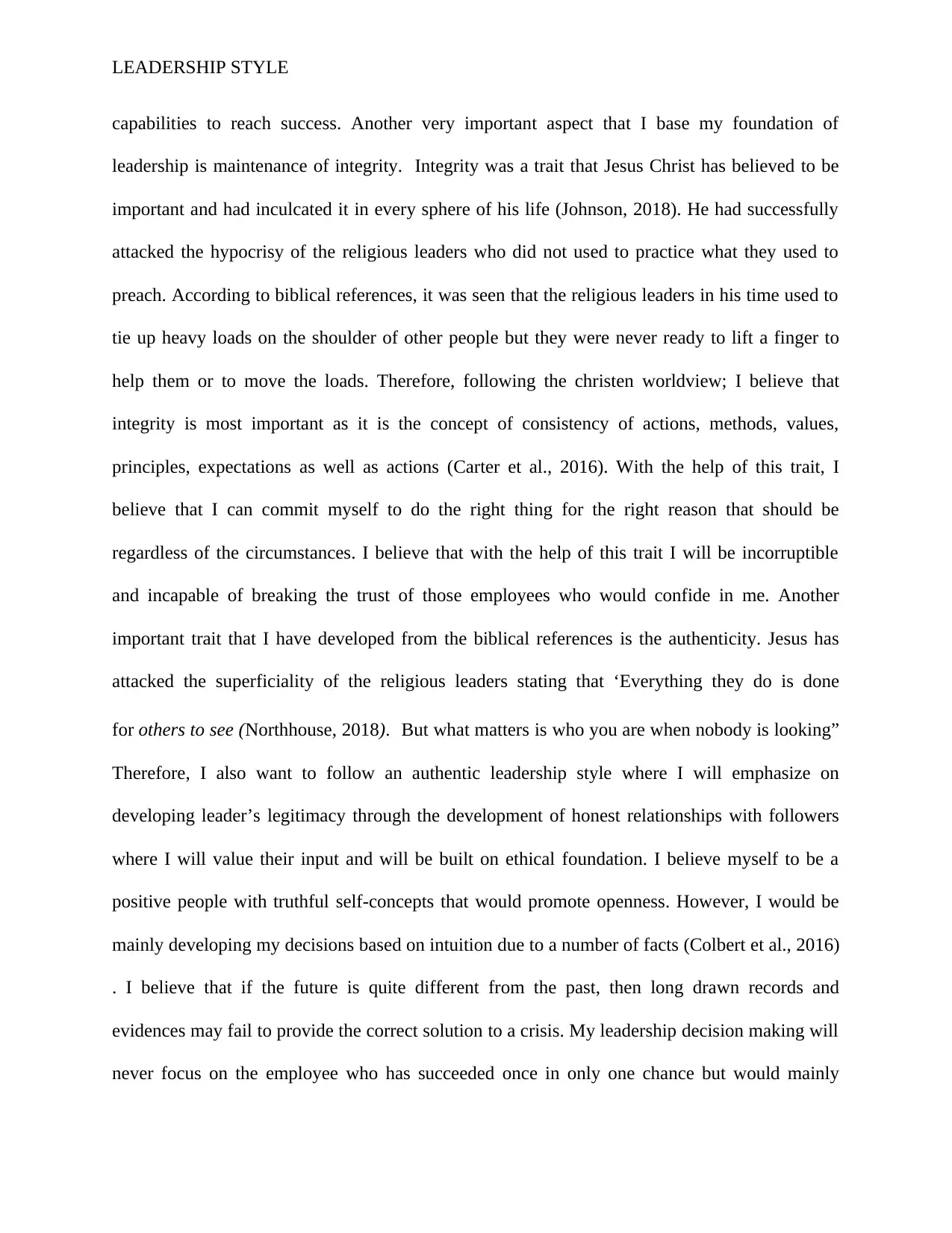
LEADERSHIP STYLE
capabilities to reach success. Another very important aspect that I base my foundation of
leadership is maintenance of integrity. Integrity was a trait that Jesus Christ has believed to be
important and had inculcated it in every sphere of his life (Johnson, 2018). He had successfully
attacked the hypocrisy of the religious leaders who did not used to practice what they used to
preach. According to biblical references, it was seen that the religious leaders in his time used to
tie up heavy loads on the shoulder of other people but they were never ready to lift a finger to
help them or to move the loads. Therefore, following the christen worldview; I believe that
integrity is most important as it is the concept of consistency of actions, methods, values,
principles, expectations as well as actions (Carter et al., 2016). With the help of this trait, I
believe that I can commit myself to do the right thing for the right reason that should be
regardless of the circumstances. I believe that with the help of this trait I will be incorruptible
and incapable of breaking the trust of those employees who would confide in me. Another
important trait that I have developed from the biblical references is the authenticity. Jesus has
attacked the superficiality of the religious leaders stating that ‘Everything they do is done
for others to see (Northhouse, 2018). But what matters is who you are when nobody is looking”
Therefore, I also want to follow an authentic leadership style where I will emphasize on
developing leader’s legitimacy through the development of honest relationships with followers
where I will value their input and will be built on ethical foundation. I believe myself to be a
positive people with truthful self-concepts that would promote openness. However, I would be
mainly developing my decisions based on intuition due to a number of facts (Colbert et al., 2016)
. I believe that if the future is quite different from the past, then long drawn records and
evidences may fail to provide the correct solution to a crisis. My leadership decision making will
never focus on the employee who has succeeded once in only one chance but would mainly
capabilities to reach success. Another very important aspect that I base my foundation of
leadership is maintenance of integrity. Integrity was a trait that Jesus Christ has believed to be
important and had inculcated it in every sphere of his life (Johnson, 2018). He had successfully
attacked the hypocrisy of the religious leaders who did not used to practice what they used to
preach. According to biblical references, it was seen that the religious leaders in his time used to
tie up heavy loads on the shoulder of other people but they were never ready to lift a finger to
help them or to move the loads. Therefore, following the christen worldview; I believe that
integrity is most important as it is the concept of consistency of actions, methods, values,
principles, expectations as well as actions (Carter et al., 2016). With the help of this trait, I
believe that I can commit myself to do the right thing for the right reason that should be
regardless of the circumstances. I believe that with the help of this trait I will be incorruptible
and incapable of breaking the trust of those employees who would confide in me. Another
important trait that I have developed from the biblical references is the authenticity. Jesus has
attacked the superficiality of the religious leaders stating that ‘Everything they do is done
for others to see (Northhouse, 2018). But what matters is who you are when nobody is looking”
Therefore, I also want to follow an authentic leadership style where I will emphasize on
developing leader’s legitimacy through the development of honest relationships with followers
where I will value their input and will be built on ethical foundation. I believe myself to be a
positive people with truthful self-concepts that would promote openness. However, I would be
mainly developing my decisions based on intuition due to a number of facts (Colbert et al., 2016)
. I believe that if the future is quite different from the past, then long drawn records and
evidences may fail to provide the correct solution to a crisis. My leadership decision making will
never focus on the employee who has succeeded once in only one chance but would mainly
⊘ This is a preview!⊘
Do you want full access?
Subscribe today to unlock all pages.

Trusted by 1+ million students worldwide
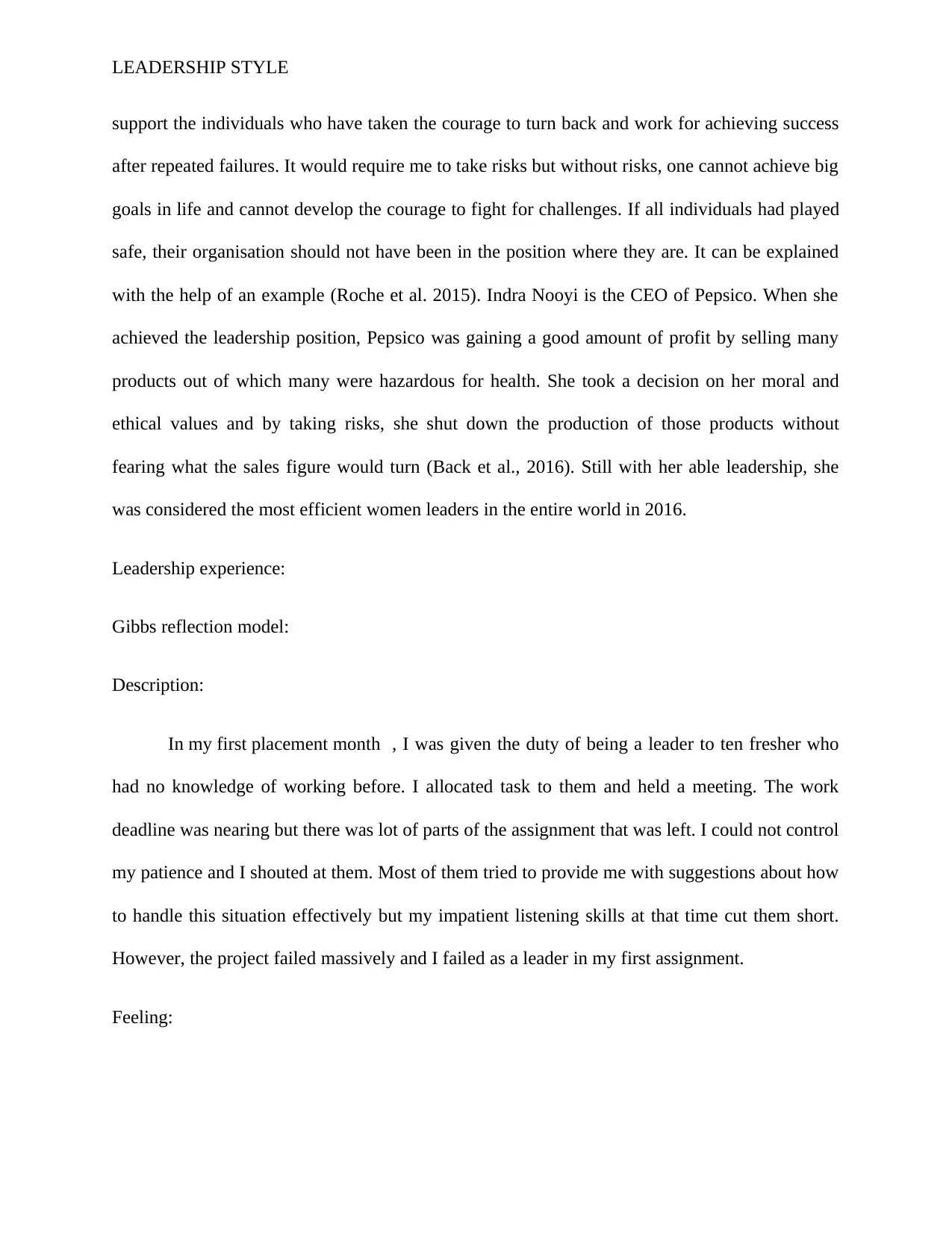
LEADERSHIP STYLE
support the individuals who have taken the courage to turn back and work for achieving success
after repeated failures. It would require me to take risks but without risks, one cannot achieve big
goals in life and cannot develop the courage to fight for challenges. If all individuals had played
safe, their organisation should not have been in the position where they are. It can be explained
with the help of an example (Roche et al. 2015). Indra Nooyi is the CEO of Pepsico. When she
achieved the leadership position, Pepsico was gaining a good amount of profit by selling many
products out of which many were hazardous for health. She took a decision on her moral and
ethical values and by taking risks, she shut down the production of those products without
fearing what the sales figure would turn (Back et al., 2016). Still with her able leadership, she
was considered the most efficient women leaders in the entire world in 2016.
Leadership experience:
Gibbs reflection model:
Description:
In my first placement month , I was given the duty of being a leader to ten fresher who
had no knowledge of working before. I allocated task to them and held a meeting. The work
deadline was nearing but there was lot of parts of the assignment that was left. I could not control
my patience and I shouted at them. Most of them tried to provide me with suggestions about how
to handle this situation effectively but my impatient listening skills at that time cut them short.
However, the project failed massively and I failed as a leader in my first assignment.
Feeling:
support the individuals who have taken the courage to turn back and work for achieving success
after repeated failures. It would require me to take risks but without risks, one cannot achieve big
goals in life and cannot develop the courage to fight for challenges. If all individuals had played
safe, their organisation should not have been in the position where they are. It can be explained
with the help of an example (Roche et al. 2015). Indra Nooyi is the CEO of Pepsico. When she
achieved the leadership position, Pepsico was gaining a good amount of profit by selling many
products out of which many were hazardous for health. She took a decision on her moral and
ethical values and by taking risks, she shut down the production of those products without
fearing what the sales figure would turn (Back et al., 2016). Still with her able leadership, she
was considered the most efficient women leaders in the entire world in 2016.
Leadership experience:
Gibbs reflection model:
Description:
In my first placement month , I was given the duty of being a leader to ten fresher who
had no knowledge of working before. I allocated task to them and held a meeting. The work
deadline was nearing but there was lot of parts of the assignment that was left. I could not control
my patience and I shouted at them. Most of them tried to provide me with suggestions about how
to handle this situation effectively but my impatient listening skills at that time cut them short.
However, the project failed massively and I failed as a leader in my first assignment.
Feeling:
Paraphrase This Document
Need a fresh take? Get an instant paraphrase of this document with our AI Paraphraser
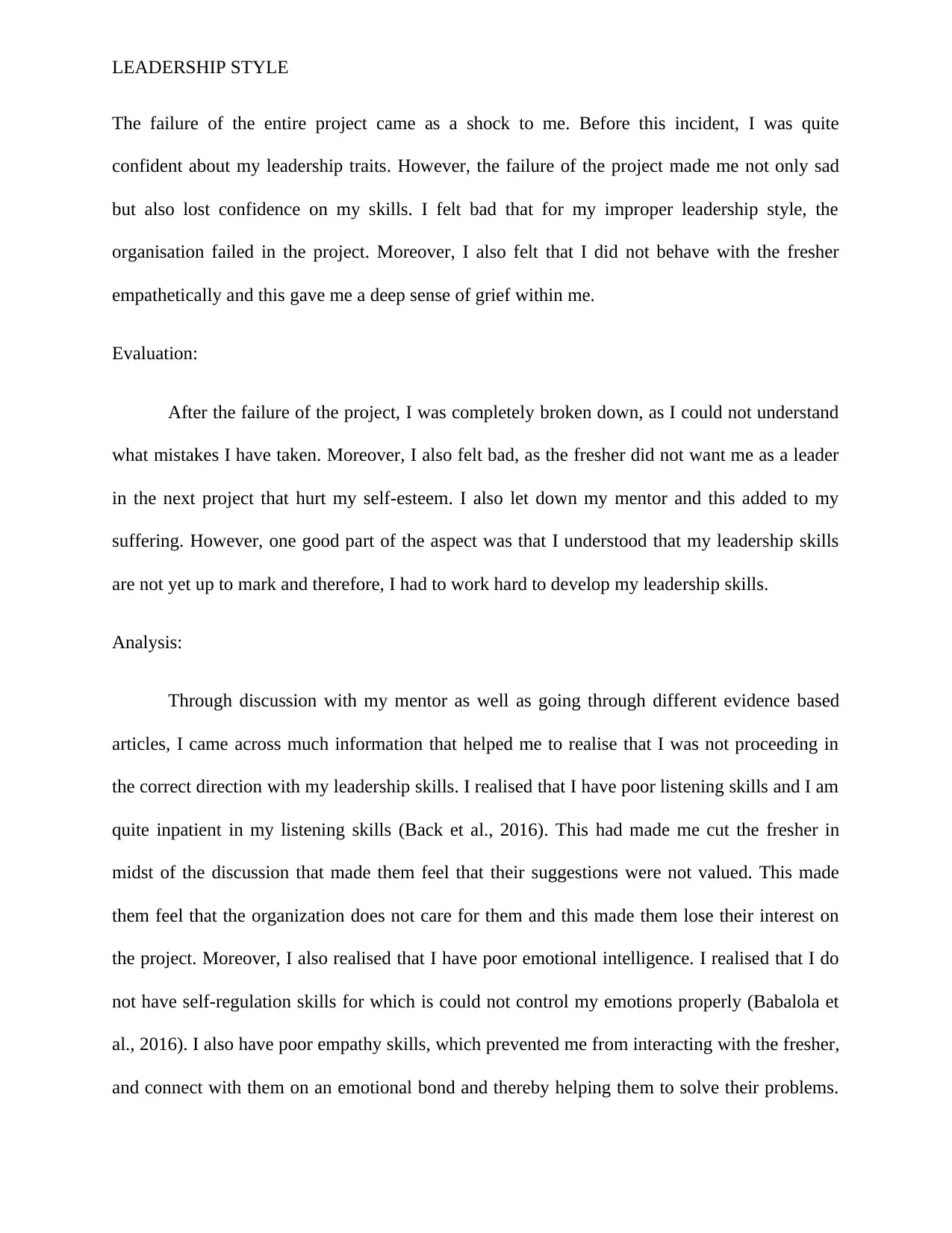
LEADERSHIP STYLE
The failure of the entire project came as a shock to me. Before this incident, I was quite
confident about my leadership traits. However, the failure of the project made me not only sad
but also lost confidence on my skills. I felt bad that for my improper leadership style, the
organisation failed in the project. Moreover, I also felt that I did not behave with the fresher
empathetically and this gave me a deep sense of grief within me.
Evaluation:
After the failure of the project, I was completely broken down, as I could not understand
what mistakes I have taken. Moreover, I also felt bad, as the fresher did not want me as a leader
in the next project that hurt my self-esteem. I also let down my mentor and this added to my
suffering. However, one good part of the aspect was that I understood that my leadership skills
are not yet up to mark and therefore, I had to work hard to develop my leadership skills.
Analysis:
Through discussion with my mentor as well as going through different evidence based
articles, I came across much information that helped me to realise that I was not proceeding in
the correct direction with my leadership skills. I realised that I have poor listening skills and I am
quite inpatient in my listening skills (Back et al., 2016). This had made me cut the fresher in
midst of the discussion that made them feel that their suggestions were not valued. This made
them feel that the organization does not care for them and this made them lose their interest on
the project. Moreover, I also realised that I have poor emotional intelligence. I realised that I do
not have self-regulation skills for which is could not control my emotions properly (Babalola et
al., 2016). I also have poor empathy skills, which prevented me from interacting with the fresher,
and connect with them on an emotional bond and thereby helping them to solve their problems.
The failure of the entire project came as a shock to me. Before this incident, I was quite
confident about my leadership traits. However, the failure of the project made me not only sad
but also lost confidence on my skills. I felt bad that for my improper leadership style, the
organisation failed in the project. Moreover, I also felt that I did not behave with the fresher
empathetically and this gave me a deep sense of grief within me.
Evaluation:
After the failure of the project, I was completely broken down, as I could not understand
what mistakes I have taken. Moreover, I also felt bad, as the fresher did not want me as a leader
in the next project that hurt my self-esteem. I also let down my mentor and this added to my
suffering. However, one good part of the aspect was that I understood that my leadership skills
are not yet up to mark and therefore, I had to work hard to develop my leadership skills.
Analysis:
Through discussion with my mentor as well as going through different evidence based
articles, I came across much information that helped me to realise that I was not proceeding in
the correct direction with my leadership skills. I realised that I have poor listening skills and I am
quite inpatient in my listening skills (Back et al., 2016). This had made me cut the fresher in
midst of the discussion that made them feel that their suggestions were not valued. This made
them feel that the organization does not care for them and this made them lose their interest on
the project. Moreover, I also realised that I have poor emotional intelligence. I realised that I do
not have self-regulation skills for which is could not control my emotions properly (Babalola et
al., 2016). I also have poor empathy skills, which prevented me from interacting with the fresher,
and connect with them on an emotional bond and thereby helping them to solve their problems.
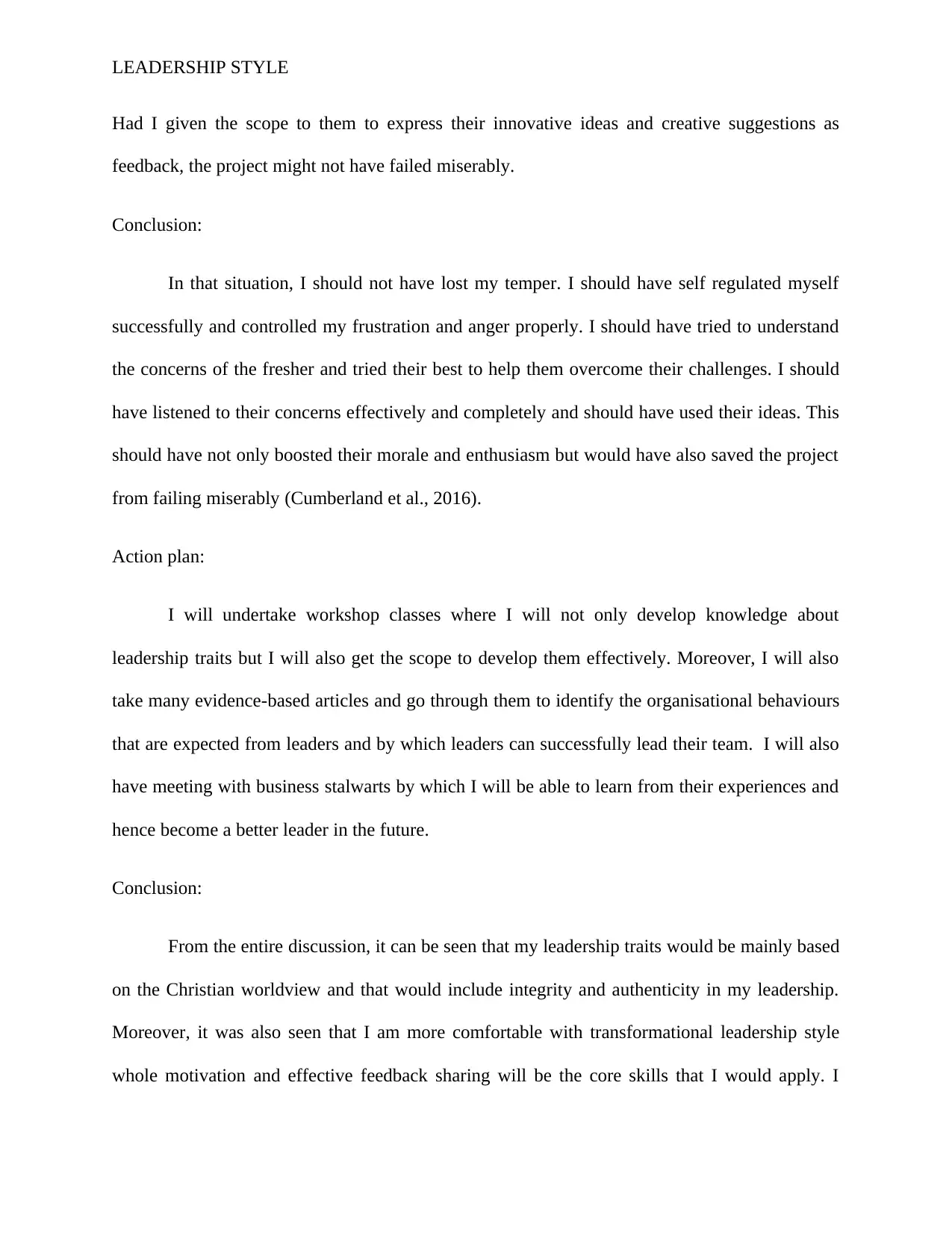
LEADERSHIP STYLE
Had I given the scope to them to express their innovative ideas and creative suggestions as
feedback, the project might not have failed miserably.
Conclusion:
In that situation, I should not have lost my temper. I should have self regulated myself
successfully and controlled my frustration and anger properly. I should have tried to understand
the concerns of the fresher and tried their best to help them overcome their challenges. I should
have listened to their concerns effectively and completely and should have used their ideas. This
should have not only boosted their morale and enthusiasm but would have also saved the project
from failing miserably (Cumberland et al., 2016).
Action plan:
I will undertake workshop classes where I will not only develop knowledge about
leadership traits but I will also get the scope to develop them effectively. Moreover, I will also
take many evidence-based articles and go through them to identify the organisational behaviours
that are expected from leaders and by which leaders can successfully lead their team. I will also
have meeting with business stalwarts by which I will be able to learn from their experiences and
hence become a better leader in the future.
Conclusion:
From the entire discussion, it can be seen that my leadership traits would be mainly based
on the Christian worldview and that would include integrity and authenticity in my leadership.
Moreover, it was also seen that I am more comfortable with transformational leadership style
whole motivation and effective feedback sharing will be the core skills that I would apply. I
Had I given the scope to them to express their innovative ideas and creative suggestions as
feedback, the project might not have failed miserably.
Conclusion:
In that situation, I should not have lost my temper. I should have self regulated myself
successfully and controlled my frustration and anger properly. I should have tried to understand
the concerns of the fresher and tried their best to help them overcome their challenges. I should
have listened to their concerns effectively and completely and should have used their ideas. This
should have not only boosted their morale and enthusiasm but would have also saved the project
from failing miserably (Cumberland et al., 2016).
Action plan:
I will undertake workshop classes where I will not only develop knowledge about
leadership traits but I will also get the scope to develop them effectively. Moreover, I will also
take many evidence-based articles and go through them to identify the organisational behaviours
that are expected from leaders and by which leaders can successfully lead their team. I will also
have meeting with business stalwarts by which I will be able to learn from their experiences and
hence become a better leader in the future.
Conclusion:
From the entire discussion, it can be seen that my leadership traits would be mainly based
on the Christian worldview and that would include integrity and authenticity in my leadership.
Moreover, it was also seen that I am more comfortable with transformational leadership style
whole motivation and effective feedback sharing will be the core skills that I would apply. I
⊘ This is a preview!⊘
Do you want full access?
Subscribe today to unlock all pages.

Trusted by 1+ million students worldwide
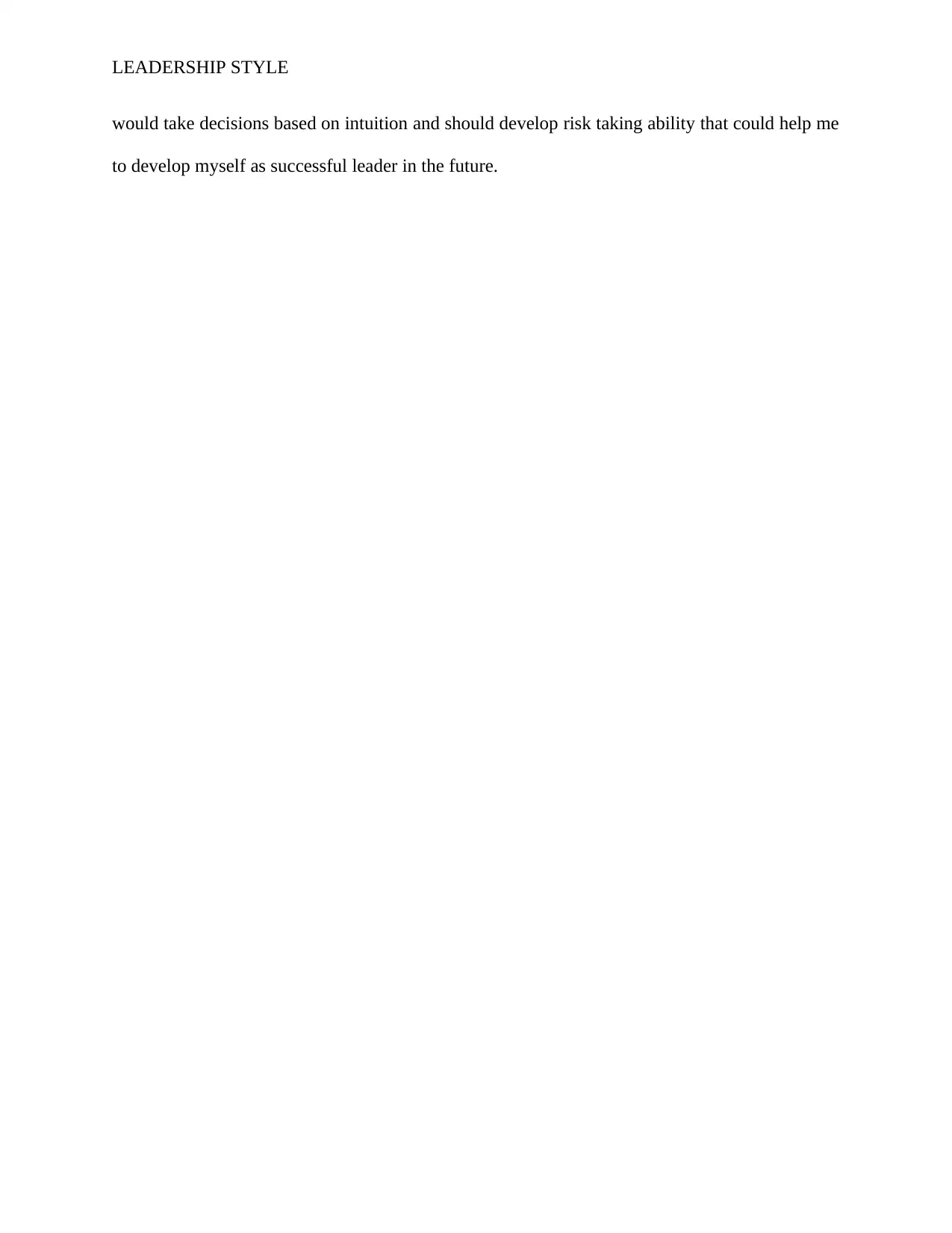
LEADERSHIP STYLE
would take decisions based on intuition and should develop risk taking ability that could help me
to develop myself as successful leader in the future.
would take decisions based on intuition and should develop risk taking ability that could help me
to develop myself as successful leader in the future.
Paraphrase This Document
Need a fresh take? Get an instant paraphrase of this document with our AI Paraphraser
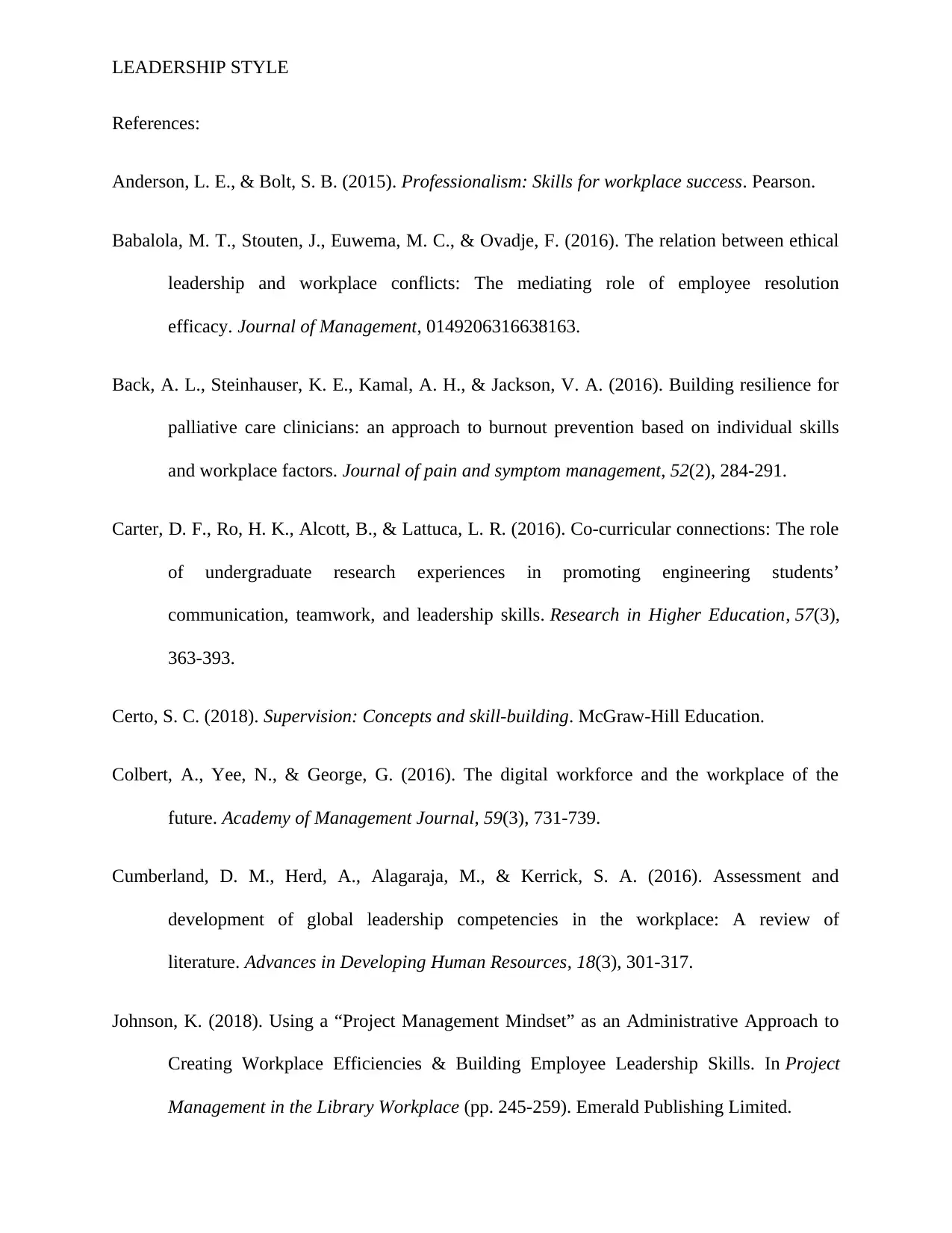
LEADERSHIP STYLE
References:
Anderson, L. E., & Bolt, S. B. (2015). Professionalism: Skills for workplace success. Pearson.
Babalola, M. T., Stouten, J., Euwema, M. C., & Ovadje, F. (2016). The relation between ethical
leadership and workplace conflicts: The mediating role of employee resolution
efficacy. Journal of Management, 0149206316638163.
Back, A. L., Steinhauser, K. E., Kamal, A. H., & Jackson, V. A. (2016). Building resilience for
palliative care clinicians: an approach to burnout prevention based on individual skills
and workplace factors. Journal of pain and symptom management, 52(2), 284-291.
Carter, D. F., Ro, H. K., Alcott, B., & Lattuca, L. R. (2016). Co-curricular connections: The role
of undergraduate research experiences in promoting engineering students’
communication, teamwork, and leadership skills. Research in Higher Education, 57(3),
363-393.
Certo, S. C. (2018). Supervision: Concepts and skill-building. McGraw-Hill Education.
Colbert, A., Yee, N., & George, G. (2016). The digital workforce and the workplace of the
future. Academy of Management Journal, 59(3), 731-739.
Cumberland, D. M., Herd, A., Alagaraja, M., & Kerrick, S. A. (2016). Assessment and
development of global leadership competencies in the workplace: A review of
literature. Advances in Developing Human Resources, 18(3), 301-317.
Johnson, K. (2018). Using a “Project Management Mindset” as an Administrative Approach to
Creating Workplace Efficiencies & Building Employee Leadership Skills. In Project
Management in the Library Workplace (pp. 245-259). Emerald Publishing Limited.
References:
Anderson, L. E., & Bolt, S. B. (2015). Professionalism: Skills for workplace success. Pearson.
Babalola, M. T., Stouten, J., Euwema, M. C., & Ovadje, F. (2016). The relation between ethical
leadership and workplace conflicts: The mediating role of employee resolution
efficacy. Journal of Management, 0149206316638163.
Back, A. L., Steinhauser, K. E., Kamal, A. H., & Jackson, V. A. (2016). Building resilience for
palliative care clinicians: an approach to burnout prevention based on individual skills
and workplace factors. Journal of pain and symptom management, 52(2), 284-291.
Carter, D. F., Ro, H. K., Alcott, B., & Lattuca, L. R. (2016). Co-curricular connections: The role
of undergraduate research experiences in promoting engineering students’
communication, teamwork, and leadership skills. Research in Higher Education, 57(3),
363-393.
Certo, S. C. (2018). Supervision: Concepts and skill-building. McGraw-Hill Education.
Colbert, A., Yee, N., & George, G. (2016). The digital workforce and the workplace of the
future. Academy of Management Journal, 59(3), 731-739.
Cumberland, D. M., Herd, A., Alagaraja, M., & Kerrick, S. A. (2016). Assessment and
development of global leadership competencies in the workplace: A review of
literature. Advances in Developing Human Resources, 18(3), 301-317.
Johnson, K. (2018). Using a “Project Management Mindset” as an Administrative Approach to
Creating Workplace Efficiencies & Building Employee Leadership Skills. In Project
Management in the Library Workplace (pp. 245-259). Emerald Publishing Limited.
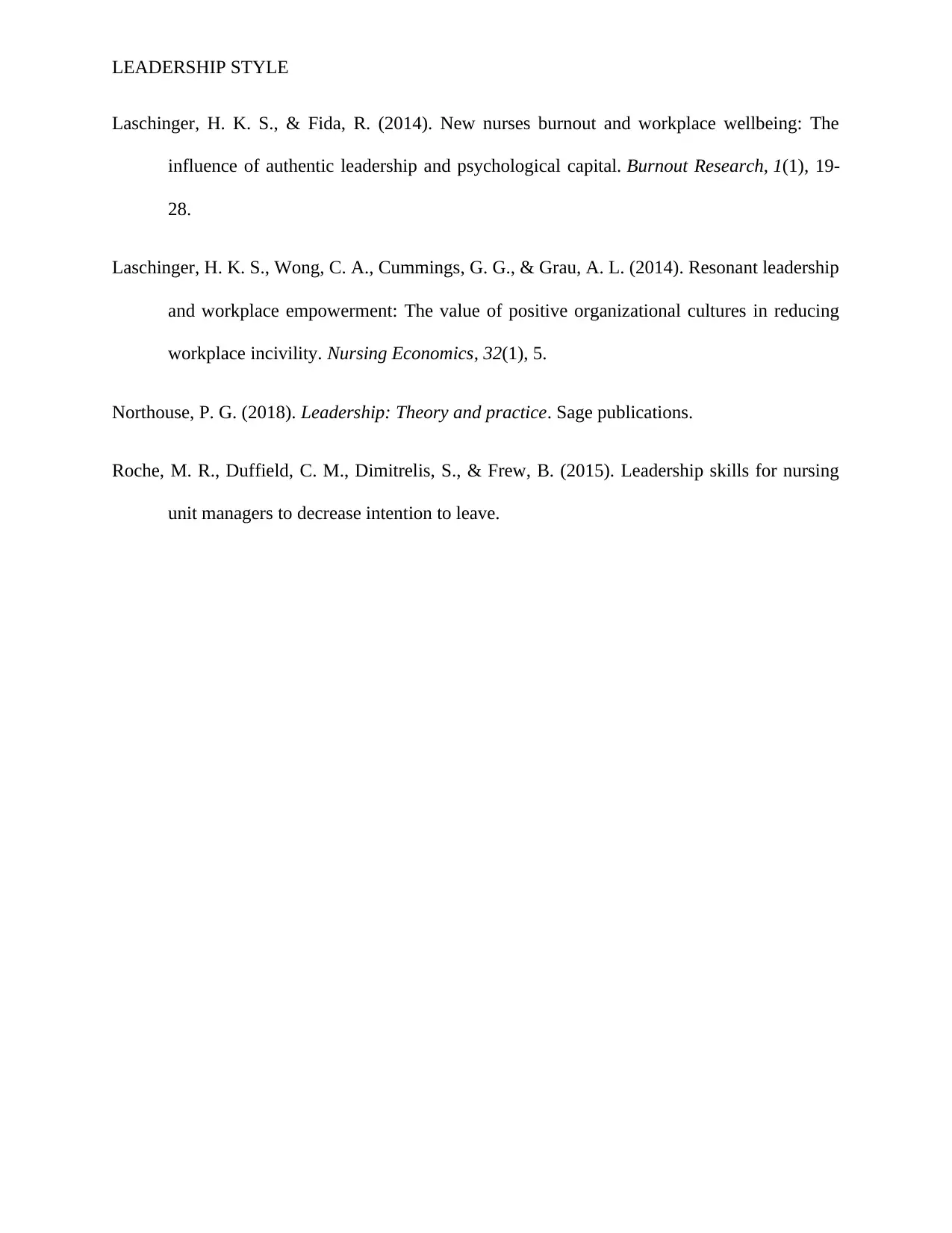
LEADERSHIP STYLE
Laschinger, H. K. S., & Fida, R. (2014). New nurses burnout and workplace wellbeing: The
influence of authentic leadership and psychological capital. Burnout Research, 1(1), 19-
28.
Laschinger, H. K. S., Wong, C. A., Cummings, G. G., & Grau, A. L. (2014). Resonant leadership
and workplace empowerment: The value of positive organizational cultures in reducing
workplace incivility. Nursing Economics, 32(1), 5.
Northouse, P. G. (2018). Leadership: Theory and practice. Sage publications.
Roche, M. R., Duffield, C. M., Dimitrelis, S., & Frew, B. (2015). Leadership skills for nursing
unit managers to decrease intention to leave.
Laschinger, H. K. S., & Fida, R. (2014). New nurses burnout and workplace wellbeing: The
influence of authentic leadership and psychological capital. Burnout Research, 1(1), 19-
28.
Laschinger, H. K. S., Wong, C. A., Cummings, G. G., & Grau, A. L. (2014). Resonant leadership
and workplace empowerment: The value of positive organizational cultures in reducing
workplace incivility. Nursing Economics, 32(1), 5.
Northouse, P. G. (2018). Leadership: Theory and practice. Sage publications.
Roche, M. R., Duffield, C. M., Dimitrelis, S., & Frew, B. (2015). Leadership skills for nursing
unit managers to decrease intention to leave.
⊘ This is a preview!⊘
Do you want full access?
Subscribe today to unlock all pages.

Trusted by 1+ million students worldwide
1 out of 9
Related Documents
Your All-in-One AI-Powered Toolkit for Academic Success.
+13062052269
info@desklib.com
Available 24*7 on WhatsApp / Email
![[object Object]](/_next/static/media/star-bottom.7253800d.svg)
Unlock your academic potential
Copyright © 2020–2026 A2Z Services. All Rights Reserved. Developed and managed by ZUCOL.





